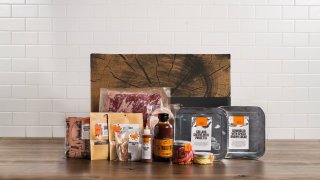
- At-home barbecuing and grilling saw massive growth amid the pandemic as more people ate at home.
- Newly public grill manufacturers Traeger and Weber both benefitted, reporting significant year-over-year sales growth in their recent quarters.
- Now Traeger is looking to boost its business beyond grill sales with a barbecue meal box kit featuring proteins like Wagyu brisket and Berkshire St. Louis ribs.
Traeger Grills CEO Jeremy Andrus said he views the company's wood pellet grill as not an appliance or grill but a home cooking platform. That has led Traeger to push further into things like app-connected grills and digital content. Now Traeger is looking to take that a step further, not only helping budding grillers and smokers with how to use its products and what to make but supplying the food.
"One of the first things I hear from friends when they buy a Traeger and they want to cook their first brisket is, 'where do they buy a brisket," Andrus said. "Then once they figure that out, it's 'how do you trim it, what rub do I use, wait I need butcher paper, where do I get that?"
At-home barbecuing and grilling heated up during the pandemic. More than $1.1 billion of grills and smokers were sold between March and May, a 3% increase from 2020 and nearly double from 2019, according to NPD. In total, roughly 5.4 million grills and smokers were sold across those three months, the peak period for barbecue sales.
We're making it easier for you to find stories that matter with our new newsletter — The 4Front. Sign up here and get news that is important for you to your inbox.
That benefitted grill manufacturers like Trager and Weber, both of whom went public this year but have been essentially flat in trading compared to IPO pricing. Traeger reported that its total revenue grew 39.1% to $213 million in its second quarter compared to last year. Weber said that it recorded a quarterly sales record in its third quarter, which grew 19% year-over-year to $669 million.
Building the business beyond grills
While the category has boomed, the sales of physical grills have remained the main revenue driver for both companies. Traeger reported that $156 million of its $213 million in quarterly revenue came via grills, which was a 40% increase compared to the previous year. Weber does not break out its revenue splits in its quarterly earnings, but the company said in an SEC filing that 26% of its revenue is comprised of "accessories and consumables."
Money Report
With more people now having a grill in their home, the opportunity to sell additional products to use with the grill has increased. It also allows a company like Traeger to follow in the path of brands like Peloton and Lululemon, going beyond a core product to other products and revenue lines.
For Traeger, which generates about 20% of its revenue from consumables, that has largely meant sales of the pellets that power its grills. Andrus said that approximately 93% of Traeger owners have purchased pellets from the company in the last year, representing "very consistent revenue." The traditional grilling industry tends to be sort of a spring-summer business, but he said the company's consumers buy pellets year-round.
Traeger has been selling a limited number of rubs and sauces, but Andrus said the company saw an opportunity to take that a step further.
"We've seen that once you become a Traeger owner you care more about the cooking experience, you will invest more in ingredients and you care more about the source and quality of the ingredients," Andrus said. "We wanted to create something that made that experience better."
That led to the creation of Traeger Provisions, a line of all-inclusive meal boxes that can serve four to 16 people with proteins like Wagyu beef brisket and Berkshire St. Louis ribs. The boxes also come with rubs, sauces, and sides like baked beans and mac and cheese, all with directions and recipes that best utilize the Traeger grill and walk the griller through every step. The boxes are priced between $100 and $300 depending on the options a customer selects.
Helping to "cook a special meal"
Traeger will look to expand its box options going forward to offer rare proteins or more season-driven items. It will also focus on holidays — to start, Traeger Provisions will have limited-edition Thanksgiving meal options of turkey halves or an Italian-style Porchetta paired with classic Thanksgiving sides like pumpkin pie and stuffing, and Andrus said he expects similarly-themed boxes around other events where cooking is part of the celebration like Easter or the Fourth of July.
"The expectation is not that this is going to replace the grocery store or that this is an everyday cooking experience," Andrus said. "Anyone who aspires to cook a special meal, this is for them."
That will put Traeger somewhat in competition not only with local retailers where grillers might be sourcing meats and meals, but also other meal delivery companies like Blue Apron or mail-order meat brands like Omaha Steaks.
Andrus said that the brand loyalty to Traeger will make this option stand out among those, but also that "if you look at who we might be competing with, it's everyone who sells food, so it's so big and fragmented if we can just get a tiny sliver of that, no one feels it except Trager."
Traeger said it is forecasting that there is a market opportunity of up to $20 billion, with the ability to reach 1 million customers over the next several years with this new effort. Andrus said that early testing showed that 92% of participants intended to purchase another box, while 58% said they would be interested in four or more boxes per year.
"It's really an opportunity in a massive, massive space to feed a Traeger family or friends four, five or six times a year, which when you think about it adds up to something that's actually potentially much larger than a core business," he said, adding that one goal will be to reach customers who don't yet have a Traeger but would be interested in the quality of the box.
The new provisions line is part of the company's push to be viewed as more than just a grill manufacturer, just as Peloton is not just viewed as a spin bike manufacturer, Andrus said.
"It started [for Peloton] with a spin bike with a screen with content coming in, and then they figured out how to leverage that community, how you do workouts when you're off the bike, how you turn the screen and get weights, how you provide a digital experience for someone who is on the road, and what apparel is appropriate for the exercise", he said. "It's a platform for a consumer who trusts Peloton for all of their home fitness needs."
"We think about Traeger as a home cooking experience, and anything that leads to that process we want to be a part of," Andrus said.






